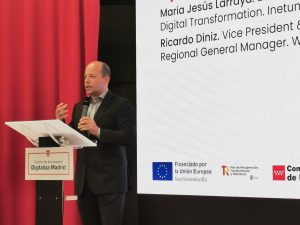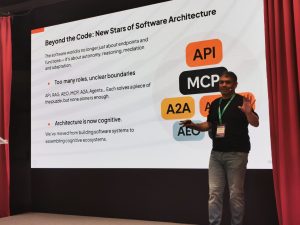WSO2 Analyses the Evolution of APIs with the Impact of AI

We attended the WSO2 Oxygenate Spain 2025 event, where the open source software manufacturer, together with its partner Inetum, highlighted the importance of APIs and analysed how they will evolve with the impact of generative artificial intelligence and agents.
Yesterday, the Digitaliza Madrid headquarters hosted a new edition of the WSO2 Oxygenate Spain 2025 event, where the software manufacturer specialising in API management, WSO2, together with its partner Inetum, shared knowledge and discussed technological modernisation and innovation, concepts where specific objectives must be set despite the fact they constitute a long-term journey.
WSO2 is in the midst of expansion in Europe, as Sanjiva Weerawarana, CEO and Head of Product at the company, revealed in a recent interview.
This was confirmed on this occasion by Ricardo Diniz, Vice President and Regional Managing Director of WSO2, during his participation in the event, where he provided details about the company’s new European headquarters located in Madrid: ‘We have set ourselves the challenge of tripling or quadrupling the size of WSO2 over the next four years, especially in Europe, which currently accounts for 40% of global turnover’.
The Madrid office has already become the nerve centre for both the software manufacturer’s operations and R&D.

As part of this expansion, WSO2 has just created its first user group in Spain, an initiative that aims to ‘connect specialised professionals to discuss, share problems and provide valuable feedback so that WSO2 can provide solutions and value,’ as Diniz explained.
Rafael Granados, CTO of WSO2, with whom we had the opportunity to chat, will be in charge of leading this initiative and organising the first user meeting: ‘It was sorely needed. We want to get closer to the communities. For a product or technology to reach users, developers and technicians need to know about it. In my experience, I often take what I see at events back to my team and propose it. Change often comes from within, from the IT communities in companies. If you don’t reach them, you’ll hardly reach the companies. This user group is a forum for sharing experiences, problems and solutions, even things that a manufacturer says cannot be done,’ said Granados, who gave us a sneak preview that in the not too distant future he will be organising hackathons where users can experiment with interesting use cases: “To reach more companies and communities that promote our products, we have to be there. Even more so since WSO2 is an open source company”.
Indeed, WSO2 was born under the philosophy and model of open source, something that has allowed it to grow over the years to go beyond API management and reach other environments such as integration and identity management, as we learned first-hand during the WSO2CON conference held a few months ago in Barcelona.
The evolution of APIs with AI
Throughout his presentation at WSO2 Oxygenate, Granados focused on the impact that artificial intelligence is having on the API market.
The executive explained how the acronym VUCA, originally coined by the US military during the Cold War, perfectly describes the current technological environment with the impact of AI: Volatile, Uncertain, Complex and Ambiguous. He elaborated as follows:
* Volatile: We are moving from endpoints to agents, which now have ‘thought’ and will make decisions. The conversational era is in the past: ‘we are in the agentic era, and a key concept for this transition is MCPs (Model Context Protocol), which act as gears so that agents and people can interact with APIs fluidly.’ Granados pointed out that the SEO model is obsolete and that companies must position themselves so that AIs direct users directly to their stores or services.
* Uncertain: AI is evolving very quickly. While 2022 saw the rise of ChatGPT and the spread of image models, 2023 focused on democratisation and RAG (Retrieval Augmented Generation), which adds a layer of internal knowledge to AI. 2024 marked the arrival of advanced reasoning agents and models, which not only complete sentences but also ‘think’ and follow internal traces. The ‘age of agents’ is expected to revolutionise between 2026 and 2028, with significant implications, such as the potential eradication of more than 80% of customer service jobs.
* Complex: The estimated API business will reach nearly $7 billion by 2025, with 90% of developers interacting with them and more than 57% of internet traffic occurring through APIs. This ubiquity leads to a 681% increase in attacks on APIs, underscoring the importance of security. According to the CTO, ‘APIs will connect entire ecosystems that reason and make decisions, making the architecture and debugging of these pieces of code extremely complex.
* Ambiguous: AI results are not always fixed, so context is crucial to their interpretation. Thus, it will become increasingly important to contain costs and reduce data exposure as calls to AIs and APIs can skyrocket. In this regard, Granados recommended limiting calls and redirecting traffic to more economical models for certain queries: ‘Data exposure is a critical concern; security must be “by design” from the outset of the API strategy, as the existing data leakage problem with APIs is multiplied with AI.’
A more complex world, with great opportunities
During our conversation, Granados explained to Silicon that WSO2 and the world of APIs in general is in a great time. We are in a moment of transformation from normal API models to API models with reasoning logic behind them, which means that everything must be interconnected through APIs. We have five or six years in which work on APIs will grow enormously. Then it will decline, but we will already be working on other technologies that will take us to the next level.’

Indeed, AI is currently adding a new layer to the existing ones. This new layer not only makes the architecture more complex, but also introduces a context-based ecosystem: ‘APIs will be used depending on one context or another. It can be decided by a person or an agent, but the adoption of AI and new players in the API ecosystem will increase complexity,’ admitted the CTO of WSO2, referring to the VUCA world mentioned earlier.
When asked by the author how organisations should deal with these changes, Granados was clear that we are at a point where we need to adopt these technologies and work with them: ‘It is true that IT teams are very much aligned with this need because they usually want to work with the latest technology. But the problem is that companies may see it as too disruptive or as something that could expose their information, so they may prefer not to jump on board until it is more mature.’ This is nothing new, however: ’It’s similar to what happened in banking when they tried to move to the cloud, a process that has been taking place gradually. In fact, many companies in this sector still do not have everything in the cloud.”
The most digital companies or start-ups with less to lose will be very agile, while the more traditional ones will be left behind: ’It already happened with the cloud, but with AI it will be even more complex, requiring very powerful infrastructures. As a manufacturer, WSO2 offers the tools, but adoption requires a change of mindset within the company itself to consider the potential risks. If they don’t, they will suffer, so they will eventually have to go down this path,’ the executive emphasised.
Another issue raised was the increase in costs, as it is customary to pay for each call made to an API or AI. In the case of generative artificial intelligence aimed at the consumer market, users ‘do not pay’ anything when we ask ChatGPT, Deepseek, Mistral or Grok, among other services. In reality, we are paying with the data we share. In the corporate market, everything – or almost everything – is governed by the calls or queries made to the services. In this regard, Granados explained that this model is gradually changing: ‘WSO2 has already announced a change from the pay-per-call model to a pay-per-use model for computing capacity: ’Paying per call doesn’t make sense if you’re going to make a large volume of calls. This payment paradigm has to change. We have already done so, but many companies have not yet.”
In addition to this change in the payment model, Granados warned of a trend that will gradually consolidate and that we are already seeing in the consumer segment with AI PCs. This involves being able to make calls to an AI that is running locally rather than in the cloud, depending on the needs of each organisation: managers will decide where to place the pieces according to what they do. In fact, there will come a time when it will be possible to call multiple AIs, each for a specific purpose.’
On the other hand, we find learning related to ‘prompting’ or the questions we ask AI, which significantly influence operational costs. Granados’ approach to this issue is interesting, as he asserts that ’prompt engineering does not exist as such. It is more of a trial and error process. You adapt to what works. In my view, it is not like engineering, where A+B always equals C, because it is more ambiguous and also depends on the evolution that is taking place with AI models,’ according to the CTO of WSO2.
To conclude our conversation, Granados told us about his medium-term vision of agentic AI, where agents will establish multiple connections and communications between themselves without the need for human intervention. According to his forecasts, there will be a period in which APIs, AI agents and MCPs will coexist, although ‘more and more APIs will be left behind. They will not be residual, but in the long term they will remain as underlying elements, something like technical artefacts that make everything work’.
Along the way, companies like WSO2 have a lot to say, even though their technology remains somewhat ‘hidden’ behind the services that consumers and businesses use in our daily lives. Not surprisingly, more than half of global Internet traffic passes through one or more APIs.